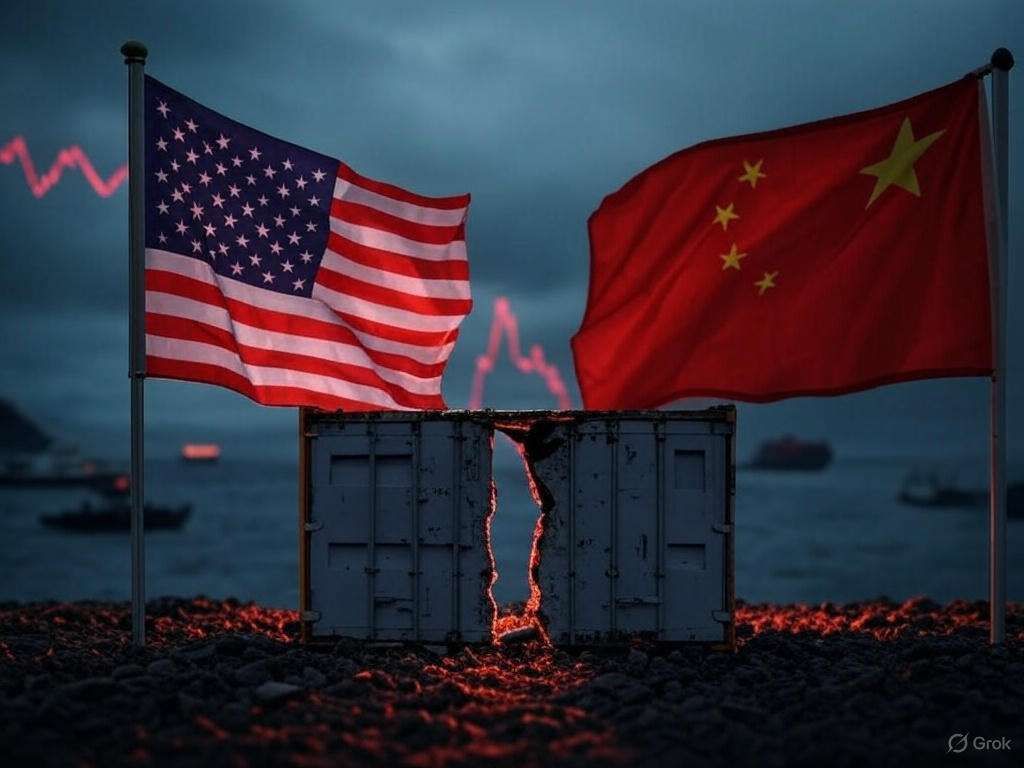Radar Armenia presents an article by Jake Werner, PhD, interim director of the East Asia Program at the Queens Institute, published on the Responsible Statecraft website.
Donald Trump has called off the global trade war with all countries except China. This suggests that even while everyone's attention was focused on the turmoil in financial markets, the most dangerous consequence of Trump's "liberation day" was the sharp escalation of the US-China conflict, which could escalate into a violent confrontation in the coming years.
Before "liberation day," relations between the two countries were already tense, with a steady escalation towards conflict. The Biden administration maintained almost all of the restrictive measures against China imposed during Trump's presidency and expanded and tightened them. Although Biden restored diplomatic relations suspended by the Trump administration, he refused to cooperate with China to mitigate the logic of the "zero-sum game" that was taking place between the two superpowers.
The new Trump administration quickly raised tariffs on China that were already in place. Initially, the parties seemed willing to reach some compromise that could ease tensions. After the election, Beijing sent several delegations to Washington to determine what concessions Trump wanted and how negotiations could begin. China has informally expressed a willingness to make concessions on various issues, from currency valuation and guarantees of the dollar's supremacy to industrial investment in the United States.
Trump has praised Xi Jinping, declaring, "He's a great guy," and has repeatedly discussed a meeting between them shortly. In February, Trump proposed that the United States, China, and Russia begin nuclear arms control talks that could lead to a halving of military spending. As I have previously noted, Trump's worldview and strategic thinking, regardless of accusations of deceit or delusion, could facilitate such deals.
That opportunity has now been lost. The United States and China are locked in a spiral of escalation that could devastate both sides.
On "Liberation Day," Trump announced that China should be punished for unfair trade practices by adding 34 percent to existing tariffs. Chinese imports are now virtually uncompetitive in the US market at these rates. More dangerously, this move gave the Chinese leadership the impression that the Trump administration had no intention of negotiating but instead sought to humiliate China and destroy its economy.
In contrast to its limited response to previous tariff restrictions, China took decisive countermeasures this time. It imposed a one-time 34 percent tariff increase on US imports, affecting $143.5 billion in US business revenue. China imposed restrictions on the export of certain strategic minerals, added several American companies to a list of "unreliable organizations," and announced the launch of an antitrust investigation into DuPont.
The Chinese government officially emergeddefended the status quo of globalization, declaring that the US goal is to dismantle the international economic order, putting its national interests above other countries' legitimate interests. The statement said, "We do not cause trouble, but we are not afraid of it either."
The statement, published in the People's Daily, was intended to reassure the Chinese population. It emphasized the economy's resilience and promised state fiscal support to strengthen domestic demand and businesses.
Trump responded with a new tweet, without diplomatic consideration: "CHINA MADE A WRONG PLAY. THEY ARE IN A PANIC — THAT IS THE WORST THING THEY CANNOT ALLOW."
Then he went "nuclear," adding another 50 percent tariff on China. China said it would retaliate the next day. Trump postponed the "liberation day" for other countries but simultaneously announced an additional 21 percent tariff. In total, since the beginning of his term, the United States has increased tariffs by 125 percent and China by 84 percent.
There is a widespread belief in the United States that China's economy is too fragile to withstand economic pressure. China is expected to be forced to withdraw from the American market and redirect sales to other regions, alienating Europe, Japan, and the Global South. However, such confidence could lead to serious miscalculations if the conflict escalates.
Yes, China is facing the collapse of the real estate bubble and the difficulties of a transitional growth model as early as 2021, resulting in high unemployment among young people unemployment and persistent deflation. However, China has significant opportunities to stimulate domestic demand through fiscal measures. While economic reform is now a priority, the authorities are likely to resort to economic stimulus measures in an emergency.
Unlike China, Trump, although he has somewhat backed down from global trade pressures, has not completely abandoned them. This means that the US economy and economic relations with other countries may enter a period of deep uncertainty, threatening with rising inflation and economic slowdown. At the same time, the Chinese economy may strengthen its growth rates.
Today, the US and China are in an actual conflict. Until now, the primary restraining factor has been the lack of effectiveness of US measures. Now, that condition has disappeared.
Where will this conflict lead? The most likely consequence is the disruption of global supply chains. Many companies may close, while others may find illegal ways to circulate smuggled goods. Some Chinese production could be shifted to Latin American countries, avoiding US restrictions.
This could lead to new escalations. The US would try to crack down on smuggling, while China would target strategic sectors of the US economy. The parties would pressure third countries to strengthen their influence, creating the risk of conflict through proxies. More worryingly, both sides could be tempted to resort to direct strikes, targeting vital national security targets.
China usually responds to any escalation with proportionate steps. It is interested in avoiding unpredictable developments and exploiting US actions to strengthen its regional diplomacy and European ties.
The same cannot be said about the Trump administration. Trump seems to be seeking a show of strength and subservience, which contradicts the mentality of the Chinese leadership. As his frustration deepens, especially if China's economy falters, he may be inclined to take more aggressive steps, relying on provocative advice from his national security team. Members of that team are increasingly in favor of confrontation with China.
The Pentagon's "Interim National Defense Strategic Guide" shows how easily an economic conflict can escalate into a military confrontation. Defense Department leaders could use the breakdown in U.S.-China relations to bolster their military presence in Asia, defining it as "a top U.S. strategic objective."
Such a course destabilized even under the Biden administration, which was simultaneously trying to introduce restraint. With economic damage mounting and nationalism surging, both sides could make dangerous mistakes in response to provocations.
Any miscalculation over Taiwan or the South China Sea could have disastrous consequences.


















